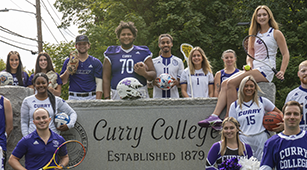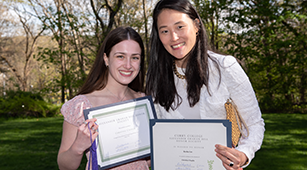Frequently Asked Questions
Q: What is the nature of the support offered by PAL?
A: Students meet regularly (two to three times per week) with a PAL professor - a learning specialist who is also a Curry College faculty member - in a combination of individual and/or small group classes. Students are helped to understand their learning styles and, based on that understanding, to develop and implement strategies in areas such as reading, writing, note-taking, time management, organization, and test-taking.
Q: What are the criteria for acceptance into PAL?
A: PAL admits students with diagnosed learning differences and/or AD/HD, who have intellectual ability ranging from at least average to superior, and who can understand and interact with college level material (i.e., analyze and synthesize abstract concepts). Further, students must have independent living skills and be motivated to participate as full partners in their learning (as revealed by attendance and commitment to PAL and other classes).
Q: My testing does not provide a specific diagnosis. Should I still apply to PAL?
A: Yes. We can usually determine on the basis of the diagnostic information you submit whether your disability meets our criteria. The special education professionals at your school may also be able to help you answer this question.
Q: Can I submit testing that is older than is specified by PAL?
A: Certain circumstances will be considered on a case-by-case basis. Generally, testing should be current (within the past three years) so we know exactly what your ability and skill levels are at the time of entrance to college. We welcome older testing along with current testing, if available.
Q: My high school is unwilling to do updated testing and/or is unwilling to administer the tests you require. What do I do?
A: Many private educational consultants, children's medical centers, and psychologists will conduct testing for college admissions purposes. PAL also offers Educational Diagnostic Services for a fee (please contact 617-333-2250 or pal@curry.edu for more information). This testing is also likely to be used for more than just one purpose in the student's future so it is worthwhile to have current testing, indicating adult ability levels, on hand.
Q: Does PAL provide support for social skills issues such as those associated with Autism Spectrum Disorder and/or some nonverbal learning disabilities?
A: PAL was developed to support students with diagnosed learning differences. It is limited in its ability to support difficulties in social settings, independent living skills and daily decision-making although the College launched the SAIL (Social Achievement in Learning) program in 2024 to support these students.
Q: Does PAL provide support for students with Traumatic Brain Injury, psychiatric disabilities, sensory or motor impairments, or other disabilities?
A: PAL is not designed to support students whose primary disabling condition is other than diagnosed learning differences and/or AD/HD. Students who are accepted to Curry College who have such conditions are eligible for reasonable accommodations as defined by various federal and state laws through the Accessibility Services Office (accessibilityservices@curry.edu). Please contact Accessibility Services for more information about these services.
Q: Can I be accepted into the College but not into PAL?
A: Yes. In some instances it is decided that the program is not well suited to your needs; however, you may be accepted into the College without PAL services based on standard Admissions criteria.
Q: Is a PAL interview required?
A: An interview with PAL is highly recommended, and in some cases may be required. Schedule a PAL interview
You are also invited to attend an Open House event for the entire College held in October. For further information, please contact the Admission Office at 617-333-2210 or adm@curry.edu.
Q: If I am denied to PAL may I appeal the decision?
A: Yes. To do this you would submit a request in writing within 30 days after receiving notice of the decision. This request must be accompanied by new or additional information. Appeals not accompanied by new or additional information will not be considered.





